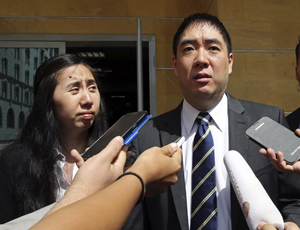
While construction-industry firms that deploy expatriates to far-flung and risky global jobsites have taken notice of the saga of one MWH Global Inc. engineer caught in a two-year legal wrangle in Qatar with new U.S. developments, employment experts say the situation is highly unusual.
Matthew Huang, a former MWH supervising engineer who was a 15-year firm veteran with previous expat experience, filed suit on Dec. 8 against his ex-employer in Los Angeles Superior Court, alleging negligence, wrongful termination and emotional distress related to his mixed-race family's treatment by the Qatar government during a two-year deployment.
The suit follows by just a few weeks the return of Huang and his family to the U.S. from Qatar, where he claims they were banned from leaving, even after he was acquitted of charges in the 2013 death of their Ghana-born adopted daughter. Huang claimed the death was related to the child's eating disorder, but Qatar authorities believed it was linked to organ trafficking.
The firm, which deployed Huang in 2012 to work on its contract for Qatar's integrated drainage master plan related to new infrastructure supporting the 2022 World Cup soccer tournment, failed to take "any reasonable risk-management measures or even [warn the family] of the forseeable dangers they faced because of their race, their family situation and the instability of the Qatari legal system," said an email from an attorney at Los Angeles-based law firm Jones Bell LLP, which is representing Matthew and Grace Huang.
In a statement, MWH said it is "disappointed" at the lawsuit, noting its support of the Huangs "on the ground, in Doha, within 24 hours of their detainment" and "hundreds of thousands on dollars" in criminal defense fees and efforts to adjust his employment status to suit his situation.
"He, instead, elected to resign," says MWH. "We urged him to reconsider. It has always been our hope that Matt would return to work at MWH, and we continue to consider job opportunities" for him.
A spokeswoman told ENR on Dec. 15 that the firm has not yet officially responded to the suit, but she declined to elaborate further on Huang's charges.
The complaint alleges the company did not obtain international hazard insurance, establish a crisis management framework or provide the Huangs with intercultural or security training, other than instruction related to emergency evacuation.
The Jones Bell attorney says MWH should have briefed the Huangs on Qatari legal and cultural issues related to mixed-race families and adoption.
Huang contends that the imprisonment in Qatar led to a diagnosis of post-traumatic stress disorder, which did not allow him to work, he says. Options offered by his employer forced his resignation, he contends.
The Jones Bell attorney says MWH initially accepted its obligation to indemnify and defend Huang but was negligent in securing suitable legal and crisis-management teams, which the law firm claims would have prevented the conviction and allowed the family to return to the U.S. much sooner.
Jones Bell says the amount of damages being sought by the Huangs will be determined at trial but did allude to $2 million in legal expenses already incurred.
"While this expat-unfairly-arrested-and-imprisoned-for-a-long-time scenario comes up occasionally, I think it is very rare," says Donald C. Dowling, international employment law partner at White & Case, New York City. "It probably is not common enough to be something employers will decide is worth taking tailored protections to avoid. The bigger picture is that employers need to heed the duty of care generally when sending expats abroad."
In an article published in December, Dowling notes that workplace health and safety laws "are vague as to how employers must heed the duty of care in the crisis/disaster/pandemic context" and that personal-injury lawsuits by global expats against employers are more likely.
He said, "A more viable strategy may be having mobile employees elect, as their exclusive remedy for personal-injury claims against the employer, an insurance benefit that meets workers’ compensation schedules."
Adds Dowling, "Employers do not have crystal balls. What ended up happening would have been all but impossible to predict on the front end. This was a freak occurrence."





Post a comment to this article
Report Abusive Comment